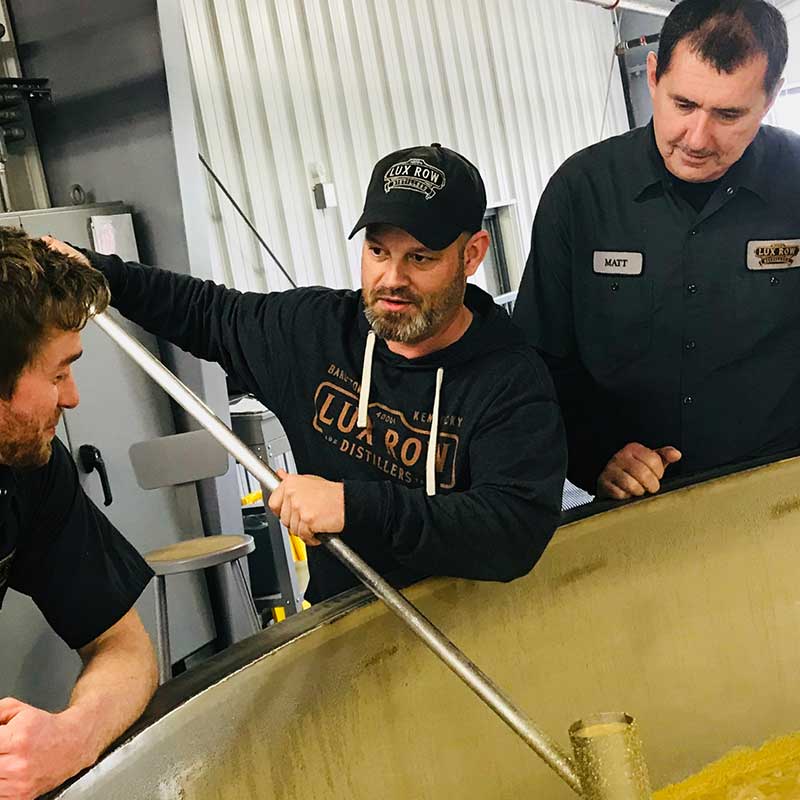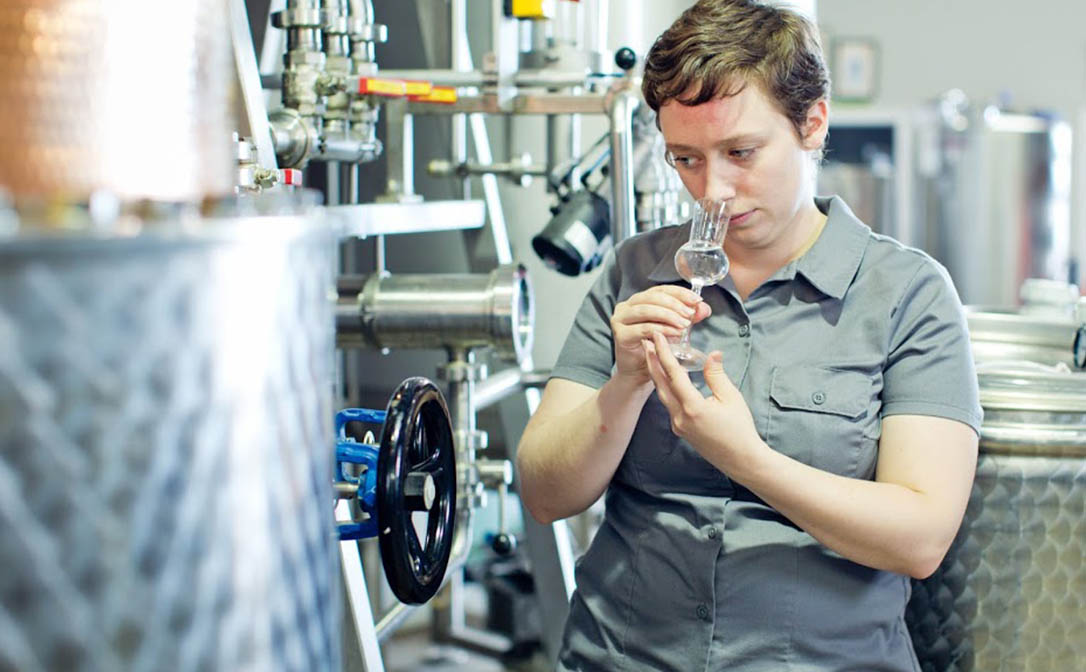To become a master distiller, gain experience through education and hands-on training in distillation techniques. Develop a deep understanding of spirits production and flavor profiles.
Becoming a master distiller requires dedication, passion, and expertise in the craft of distillation. It is essential to immerse oneself in the world of spirits, learn from experienced professionals, and continuously hone your skills. By pursuing formal education, such as distilling courses or a degree in fermentation science, combined with practical experience in a distillery setting, aspiring master distillers can refine their craft and work towards achieving this prestigious title.
In addition, networking within the industry, staying updated on industry trends, and experimenting with new techniques can further enhance your journey towards becoming a master distiller.
The Role of a Master Distiller
Master Distillers play a critical role in the production of high-quality spirits, showcasing their flawless craftsmanship and deep understanding of the art of distillation. Their expertise and attention to detail contribute significantly to the unique character and flavor profiles of the spirits they create. Let’s delve into the responsibilities and impact of these skilled professionals in the distillery world.
Responsibilities and Expertise
Master Distillers are entrusted with a myriad of responsibilities, ranging from overseeing the entire distillation process to ensuring the quality and consistency of the final product. Their expertise lies in the meticulous selection of ingredients, precise blending techniques, and the art of aging spirits to perfection. They are also responsible for creating and maintaining the recipes and production protocols that define the distillery’s signature products.
Master Distiller’s Impact on Distillery Operations
With their keen understanding of flavor profiles and distillation techniques, Master Distillers play a pivotal role in shaping the overall direction and success of a distillery. They have a direct impact on the quality and distinctiveness of the spirits produced, often setting the standard for excellence within the industry. Their expertise influences every aspect of the distillery’s operations, from recipe development to the implementation of advanced aging methods.

Credit: luxrowdistillers.com
Education and Training
Education and training play a crucial role in becoming a master distiller. While there may not be a specific degree requirement for this career path, a combination of formal education, apprenticeship, and hands-on experience is essential to gain the necessary knowledge and skills. In this section, we will explore the different approaches to achieving mastery in the field of distillation.
Formal Education
Obtaining a formal education in subjects related to distillation can provide you with a strong foundation of theoretical knowledge. While it is not the only path to becoming a master distiller, formal education can give you an edge over the competition and help you understand the science behind the art of distilling.
- A degree in chemistry, chemical engineering, or a related field can offer valuable insights into the chemical processes involved in distillation.
- Enrolling in courses or programs specifically focused on distilling, such as a distillation technology program or a brewing and distilling program, can provide specialized knowledge relevant to the industry.
- Attending workshops and seminars conducted by industry experts can further enhance your understanding of the distilling process and keep you updated on the latest techniques and trends.
Apprenticeship and Experience
While formal education lays the groundwork, apprenticeship and hands-on experience are crucial in mastering the fine art of distilling. Learning from experienced master distillers and immersing yourself in the practical aspects of the craft will help you refine your skills and develop a deep understanding of the nuances involved in producing exceptional spirits.
- Seeking out apprenticeship opportunities at established distilleries allows you to learn directly from experienced professionals and gain valuable insights into the day-to-day operations of a distillery.
- Working your way up from entry-level positions, such as cellarhand or production assistant, provides hands-on experience and exposure to different aspects of the distilling process.
- Participating in tasting panels and competitions can help sharpen your palate and further refine your ability to identify and appreciate the subtle flavors and characteristics of different spirits.
By combining formal education with hands-on experience, aspiring master distillers can develop a comprehensive skill set and knowledge base to excel in their craft. It’s important to note that becoming a master distiller requires dedication, patience, and a passion for the art of distillation. So, whether you choose the formal education route, pursue an apprenticeship, or a combination of both, never stop learning and striving for excellence in this captivating field.
Also Read: How to Become a Born Again Virgin
Understanding the Distillation Process
Understanding the distillation process is essential for those aspiring to become master distillers. This intricate procedure involves transforming raw materials into distilled spirits through heating, condensation, and separation.
Key Concepts of Distillation
- Understanding the Chemistry behind distillation is vital.
- Separating Components based on boiling points is crucial.
- Controlled Heating ensures proper vaporization.
Hands-on Experience and Experimentation
- Practical Application of theoretical knowledge is crucial.
- Trial and Error help in refining the distillation process.
- Experimenting with different variables enhances skills.
See Also: How to Become a Flight Nanny
Developing Sensory Skills
Developing Sensory Skills: Mastering the art of distillation goes beyond technical knowledge; it requires honing your sensory skills to finely tune your palate and nose.
Importance of Sensory Evaluation
Sensory Evaluation: Crucial for a master distiller to identify nuances in flavor, aroma, and texture.
Training the Palate for Flavor Detection
- Taste Tests: Conduct blind taste tests to enhance flavor recognition.
- Utilize Aromas: Practice identifying various aromas to detect subtle notes.
- Texture Analysis: Evaluate mouthfeel to understand the body of the spirit.
Managing Quality Control
Quality control is a critical aspect of becoming a master distiller. As a master distiller, it is your responsibility to ensure that the spirits you produce are of the highest quality. To do this, you need to have a firm grasp on managing quality control. In this section, we will explore two key aspects of quality control: implementing quality standards and identifying and addressing product defects.
Implementing Quality Standards
Implementing quality standards is essential to maintaining consistency and excellence in your distillery. By setting and adhering to these standards, you ensure that every batch of spirits meets your desired specifications. Here are some steps to help you implement quality standards:
- Define the quality attributes: Identify the specific characteristics that you want your spirits to possess, such as aroma, taste, color, and texture.
- Establish quality control processes: Develop procedures for testing and evaluating your spirits at various stages of production.
- Train your team: Educate your employees on the importance of quality control and provide them with the necessary tools and training to uphold the standards.
- Document and track quality data: Keep detailed records of your quality control tests and their outcomes. This data will help you identify trends and make improvements.
Identifying and Addressing Product Defects
Even with strict quality control measures in place, defects can still occur. It is crucial to promptly identify and address these defects to maintain the integrity of your brand. Here are some strategies to help you identify and address product defects:
- Regular sampling and testing: Regularly sample and test your spirits to identify any off-flavors, impurities, or inconsistencies.
- Establish a defect identification process: Develop a system for categorizing and documenting product defects as soon as they are detected.
- Trace the root cause: Investigate and determine the underlying cause of the defect. This may involve analyzing production processes, raw materials, or equipment.
- Implement corrective actions: Take appropriate measures to prevent the defect from reoccurring, such as adjusting production parameters or refining raw material selection.
- Continual improvement: Regularly review your quality control processes and make necessary adjustments to prevent future defects.
Managing quality control is an ongoing commitment that requires attention to detail, thoroughness, and a passion for excellence. By implementing quality standards and addressing product defects, you can ensure that your spirits consistently meet the high expectations of your customers.
Marketing and Business Acumen
Understanding Consumer Preferences
The first step to mastering the art of distilling is understanding consumer preferences. By conducting market research and analyzing trends, master distillers can gain valuable insights into what consumers are looking for in a distilled spirit. It’s essential to have a finger on the pulse of the market to create products that resonate with the target audience.
Branding and Product Positioning
Branding and product positioning play a vital role in the success of a master distiller. Developing a strong brand identity and effectively positioning products in the market can set a distillery apart from the competition. This involves establishing a unique selling proposition and communicating it effectively to the target audience, thereby creating a distinct and recognizable brand in the market.
Innovation and Adaptation
Mastering the craft of distillation involves constant innovation and adaptation to evolving techniques and ingredients. Embracing experimentation and honing sensory skills are key to becoming a top distiller. Refining your palate and staying curious about new trends will set you apart in the competitive spirits industry.
Innovation and Adaptation Mastering the art of distillation requires a deep understanding of tradition coupled with the ability to innovate and adapt. Embracing new trends and experimenting with unique techniques and ingredients are crucial for excelling in this timeless craft. Here’s how expert distillers stay ahead of the curve:Staying Ahead of Industry Trends
Remaining at the forefront of the industry involves closely monitoring emerging trends and consumer preferences. By staying abreast of market shifts, master distillers can anticipate and capitalize on evolving tastes and demands.Experimenting with New Ingredients and Techniques
Fearlessly exploring new ingredients and experimenting with innovative techniques allows master distillers to push the boundaries of traditional distillation. By incorporating unique flavors and methods into their craft, they can create exceptional and groundbreaking spirits.
Credit: www.wsetglobal.com
Ethical and Regulatory Considerations
Master distillers hold a significant responsibility to uphold ethical and regulatory standards in the production of distilled spirits. In this section, we will explore the key considerations for aspiring master distillers, focusing on compliance with alcohol regulations and promoting responsible production and consumption.
Compliance with Alcohol Regulations
Adhering to alcohol regulations is paramount for any master distiller to ensure the legality and integrity of their operations. Understanding and following the specific regulations set forth by regulatory bodies such as the Alcohol and Tobacco Tax and Trade Bureau (TTB) is crucial. Compliance with alcohol regulations encompasses various aspects, including labeling, licensing, and production standards.
When it comes to labeling, distillers must accurately and transparently display information such as alcohol content, brand name, and producer details. This information allows consumers to make informed choices and ensures compliance with labeling regulations.
Moreover, obtaining the necessary licenses is a vital step for master distillers. These licenses grant legal permission to produce and sell distilled spirits while complying with local and federal regulations. It is essential to complete the application process correctly and provide any supporting documentation required by the regulatory authorities.
Additionally, following production standards is crucial for compliance. This entails adhering to strict guidelines regarding ingredients, distillation processes, and quality control measures. Master distillers must maintain precise records of the production process, from sourcing raw materials to bottling the final product, to demonstrate compliance with these standards.
Promoting Responsible Production and Consumption
As custodians of the spirits industry, master distillers have a responsibility to promote responsible production and consumption. By doing so, they contribute to the well-being of consumers and help maintain the reputation of their products. Promoting responsible production and consumption involves implementing practices that minimize harm and prioritize the safety of individuals.
One method of promoting responsible production is through the use of sustainable and environmentally friendly practices. Master distillers can prioritize sourcing locally grown grains or implementing energy-efficient production processes, reducing their ecological footprint and minimizing negative impact on the environment.
Furthermore, master distillers can collaborate with organizations such as drink driving awareness campaigns or alcohol abuse prevention initiatives. By actively supporting and participating in these partnerships, they encourage responsible consumption and educate consumers on the potential risks associated with excessive alcohol intake.
| Compliance with Alcohol Regulations | Promoting Responsible Production and Consumption |
|---|---|
|
|

Credit: www.fredminnick.com
Conclusion
Becoming a master distiller is the culmination of passion, dedication, and a thirst for knowledge. From mastering the art of fermentation to honing the skill of blending and aging, this journey requires curiosity and a commitment to excellence. By following these steps, you can embark on a rewarding career in the world of distilling.
Explore the intricacies of flavor profiles, experiment with different ingredients, and never stop learning. Cheers to becoming a master distiller!
